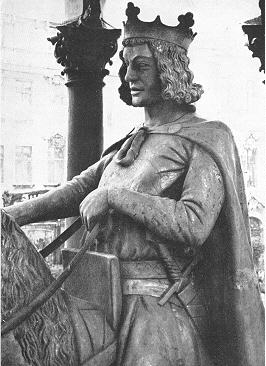Otto the Great is crowned Emperor of the Romans
Otto I was crowned Emperor of the Romans by Pope John XII on February 2nd 962.

Nostalgia for the vanished Roman Empire in the West lasted for centuries after Romulus Augustulus, the final emperor, was deposed in 476. It eventually created one of history’s oddest institutions. The Holy Roman Empire, as Voltaire sardonically remarked, was neither holy, nor Roman, nor an empire. Ironically, in view of future developments, the papacy took the lead in the attempt to create an overall secular authority in Europe when Pope Leo III crowned Charlemagne, King of the Franks, Imperator Romanorum (Emperor of the Romans) in Rome in the year 800.
After Charlemagne’s death in 814 his empire split apart and the last Carolingian so-called emperors were confined to northern and central Italy. The last of them, Berengar of Friuli, was murdered in 924. The title became more of a reality after it passed to the kings of the East Franks in what became Germany. Duke Henry the Fowler of Saxony was elected king by other German dukes in 919 and held back the Magyars, Slavs and Danes. He made no claim to the imperial title but his formidable son, Otto I, who succeeded him in 936, was far more ambitious. He had himself crowned king in Aachen, which had been Charlemagne’s capital. It looks as if he already had imperial ambitions and, according to one report, the other German dukes served him at his coronation banquet as his vassals.
Otto was now in his middle twenties. A ferocious warrior and shrewd politician, he crushed all opposition, including two rebellions by his brother Henry, who planned to murder him. Otto shrewdly forgave him and, when Henry behaved loyally, installed him as Duke of Bavaria. He also contrived to put other German dukedoms in the hands of his own relatives. He intervened effectively in French politics, subdued the Bohemians and promoted German settlement of Slavic territory east of the Elbe and the Oder. He smashed the Magyars of Hungary and put an end to their years of pillaging incursions, held the Danes back in the north, made loyal allies of the German bishops (whom he turned into feudal lords as well as ecclesiastics) and created something approaching a German state.
In 951, meanwhile, Otto invaded Italy, where an Italian lord, Berengar of Ivrea, had seized the throne and abducted Adelaide, the previous king’s widow. He tried to force her to marry his son but she escaped and pleaded for German aid. Otto crossed the Alps, took the title of King of the Lombards and married Adelaide. He allowed Berengar to go on ruling Italy, but only as his vassal.
In 961 Pope John XII (who was best known for his debauchery) desperately needed help against Berengar, who had seized part of the Papal States. He appealed to Otto, who readily came to his rescue and in return was crowned Emperor of the Romans by the pope. He then defeated and imprisoned Berengar, but the pope was soon uneasy with Otto’s dominance and started manoeuvring against him. Otto returned to Rome in 963 and had Pope John deposed by an obedient synod of bishops that he summoned for the purpose. He then had him replaced by a Roman of his own choice as Pope Leo VIII.
Otto intervened in Rome again the following year when a rebellion broke out against Pope Leo and an alternative pope was chosen. The emperor put a stop to that state of affairs and when Leo died in 965 he returned to Rome yet again to place another candidate of his choosing on the papal throne as Pope John XIII. When there was a revolt against him in turn, Otto suppressed it. He had taken control of the papacy in a way that Pope John XII had certainly not intended.
Otto went on to interfere in the territory of the eastern Roman Empire in southern Italy to such effect that in 972 the Byzantines concluded a treaty with him in which they formally recognised his own imperial title. They also bestowed a Byzantine princess, Theophano, on him as bride for his son and heir, another Otto.
The word Holy was not used for another two centuries, but Otto the Great has been recognised by historians as in effect the first of the Holy Roman Emperors and the most powerful European ruler of his time. He died in 973 and was succeeded by his only son as Otto II. The fact that Otto II had no surviving brothers as rivals was a considerable advantage and the Ottonian line of emperors continued until 1024. The revived western Roman Empire became Holy in the 12th century and from the early 1500s it was the Holy Roman Empire of the German Nation. The name was not finally dropped until 1806, a thousand years after Charlemagne.